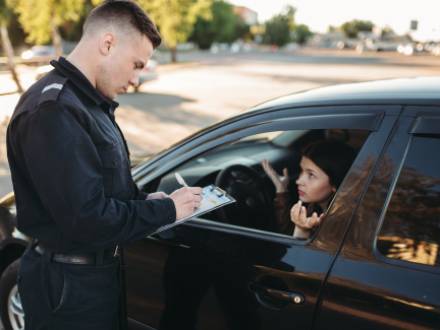Recent Blog Posts
How Much Alcohol is Too Much to Drive in Texas?
 When it comes to DWI (Driving While Intoxicated) charges in Texas, one of the most common questions we hear at The Dameron Law Firm is: How much alcohol does it take to be considered legally intoxicated? The answer depends on several factors — including your BAC (blood alcohol concentration), the time of driving, and even the timing of your blood test. Our Texas DWI defense attorney can help you understand the charges against you and what the options may be for building a tough defense.
When it comes to DWI (Driving While Intoxicated) charges in Texas, one of the most common questions we hear at The Dameron Law Firm is: How much alcohol does it take to be considered legally intoxicated? The answer depends on several factors — including your BAC (blood alcohol concentration), the time of driving, and even the timing of your blood test. Our Texas DWI defense attorney can help you understand the charges against you and what the options may be for building a tough defense.
What Is the Legal Limit for Alcohol in Texas?
Texas law defines intoxication in two main ways under Texas Penal Code § 49.01(2):
-
Loss of mental or physical faculties due to alcohol, drugs, or another substance
Understanding Administrative License Revocation (ALR) Hearings After a Texas DWI Arrest
 If you've been arrested for Driving While Intoxicated (DWI) in Texas, you may be facing an Administrative License Revocation (ALR)—a separate civil process that can suspend your driver’s license, regardless of the outcome of your criminal case. ALR hearings are governed by Texas Transportation Code Sections 524 and 724, and they are one of the first legal hurdles after a DWI arrest. A Fort Worth, Texas criminal defense attorney can help you protect your rights and understand your options.
If you've been arrested for Driving While Intoxicated (DWI) in Texas, you may be facing an Administrative License Revocation (ALR)—a separate civil process that can suspend your driver’s license, regardless of the outcome of your criminal case. ALR hearings are governed by Texas Transportation Code Sections 524 and 724, and they are one of the first legal hurdles after a DWI arrest. A Fort Worth, Texas criminal defense attorney can help you protect your rights and understand your options.
What Triggers an ALR Hearing?
The Texas Department of Public Safety (DPS) will initiate an ALR proceeding if:
-
You refuse to submit to a chemical test (blood or breath), or
-
You fail the test by providing a blood alcohol concentration (BAC) of 0.08 percent or higher.
What if I was Arrested for DWI When I Was Not Drunk?
 Being arrested for driving while intoxicated (DWI) is a serious matter, but what if you were not drunk when you were pulled over? Many people assume that DWI charges are only filed when someone is clearly impaired, but law enforcement officers can and do make mistakes. From inaccurate field sobriety tests to faulty breathalyzer results, there are several reasons why you might be wrongfully accused of DWI. In such situations, a qualified Texas criminal defense lawyer can explain your rights and legal options.
Being arrested for driving while intoxicated (DWI) is a serious matter, but what if you were not drunk when you were pulled over? Many people assume that DWI charges are only filed when someone is clearly impaired, but law enforcement officers can and do make mistakes. From inaccurate field sobriety tests to faulty breathalyzer results, there are several reasons why you might be wrongfully accused of DWI. In such situations, a qualified Texas criminal defense lawyer can explain your rights and legal options.
How Do False DWI Arrests Happen?
You can find yourself facing DWI charges even if you were sober for a variety of reasons.
Inaccurate Field Sobriety Tests
Police officers use field sobriety tests like the walk-and-turn and the horizontal gaze nystagmus test to determine whether a driver is impaired. However, results indicating that a driver is intoxicated can sometimes be explained by valid reasons other than intoxication, including various medical conditions, fatigue, or even nervousness.
Can I Be Charged with Drug Possession if the Drugs Were Not Mine?
 Did you know that in Texas, you can face drug possession charges even if the drugs found were not actually yours? Understanding how Texas law defines possession is critical if you are accused of it. A qualified Texas criminal defense lawyer with experience fighting these types of charges can explain your options and advocate for a favorable outcome.
Did you know that in Texas, you can face drug possession charges even if the drugs found were not actually yours? Understanding how Texas law defines possession is critical if you are accused of it. A qualified Texas criminal defense lawyer with experience fighting these types of charges can explain your options and advocate for a favorable outcome.
How Does Texas Law Address Drug Possession?
Under Texas law, possession is defined as having "care, custody, control, or management" of a controlled substance. You do not have to physically have drugs in your hand or pocket to be charged. Prosecutors can argue that you had access to or control over the drugs even if they were not yours.
How Can Innocent People Face Drug Possession Charges?
There are several scenarios that can result in a wrongful accusation of drug possession:
What to Know About the Controversial Affluenza Defense in Texas
 In 2013, a teenager in Texas who faced charges for killing four people in a drunk driving accident gained national attention when his defense used his wealthy upbringing and privilege as a mitigating factor. Otherwise known as the affluenza defense, the defendant’s lawyers claimed that the sense of entitlement he was raised with led him to lack the ability to understand the consequences of his actions. The defendant in this 2013 case ended up sentenced to probation, which sparked outrage and encouraged broader dialogue about how wealth and privilege can impact criminal justice, especially in Texas.
In 2013, a teenager in Texas who faced charges for killing four people in a drunk driving accident gained national attention when his defense used his wealthy upbringing and privilege as a mitigating factor. Otherwise known as the affluenza defense, the defendant’s lawyers claimed that the sense of entitlement he was raised with led him to lack the ability to understand the consequences of his actions. The defendant in this 2013 case ended up sentenced to probation, which sparked outrage and encouraged broader dialogue about how wealth and privilege can impact criminal justice, especially in Texas.
Another interesting aspect that the affluenza defense has brought up is that defense lawyers can use creative thinking in creating their criminal defense strategies. While the affluenza defense is not likely to be broadly used, the idea of thinking outside the box to defend a client’s rights is always relevant. Regardless of your charges, a creative and knowledgeable Texas defense lawyer can review your case and build a defense that is well-suited to your specific needs and background.
Can I End Up in Prison if Someone Else Gives Me Stolen Property?
 If you think about someone being charged with theft, you likely imagine that person took something that was not theirs. But did you know that in Texas, you could also face theft-related criminal charges if you did not steal anything but received something stolen by someone else?
If you think about someone being charged with theft, you likely imagine that person took something that was not theirs. But did you know that in Texas, you could also face theft-related criminal charges if you did not steal anything but received something stolen by someone else?
Many people mistakenly think that if they did not actively steal anything, they would not get into any legal trouble for the theft. However, if anything that was stolen is found in your possession, you could end up facing serious consequences. A knowledgeable Texas criminal defense lawyer can explain the laws and build a solid defense to protect your rights.
What Does Texas Law Say About Receiving Stolen Property?
According to Texas law, theft is when someone illegally comes to possess something with the intention of depriving its rightful owner of it. If you have something you know was stolen, it is considered theft even if you are not the one who stole it. In such cases, you could face the same theft charges as someone who actively stole the item.
Will I Go to Jail if I Am Caught With a Joint in Texas?
 As more and more states move toward marijuana legalization, Texas remains one of the places with some of the strictest drug laws in the country. Even small amounts of marijuana in your possession can end up leading to serious consequences.
As more and more states move toward marijuana legalization, Texas remains one of the places with some of the strictest drug laws in the country. Even small amounts of marijuana in your possession can end up leading to serious consequences.
You might be surprised to learn that if you are caught with a single joint in Texas, you could face criminal charges, fines, and even jail time. However, the outcome depends on various factors, and a qualified Texas criminal defense lawyer can review your case and build a strategy to defend you effectively.
How Does Texas Handle Marijuana Possession?
Marijuana is classified by state law as a controlled substance, and as such, it is illegal to possess it. There are some exceptions under limited circumstances when medical necessity is considered valid and the Texas Compassionate Use Program applies.
Who is Entitled to Mental Diversion Programs in Texas?
 A criminal conviction can have life-long consequences. Even once you have served your time, you could be denied educational, housing, employment, financial, and even romantic opportunities because of your criminal record. However, Texas does offer alternative sentencing and mental diversion programs under certain circumstances and for certain charges. If you are interested in possible alternative sentencing options, speak with a knowledgeable Texas criminal defense lawyer who can review your case and offer guidance.
A criminal conviction can have life-long consequences. Even once you have served your time, you could be denied educational, housing, employment, financial, and even romantic opportunities because of your criminal record. However, Texas does offer alternative sentencing and mental diversion programs under certain circumstances and for certain charges. If you are interested in possible alternative sentencing options, speak with a knowledgeable Texas criminal defense lawyer who can review your case and offer guidance.
What Are Mental Diversion Programs?
Mental diversion programs enable some defendants with mental health issues to avoid traditional criminal penalties. Instead of being sentenced to serve time in prison or jail, qualifying defendants have their cases processed in mental health courts, which focus more on rehabilitation than punishment.
How Long Does It Take To Get a Texas Criminal Record Expunged?
 Criminal records can have a serious impact on your life, even long after you serve your sentence. Many people find that legal problems from the past can hinder them in the present, particularly when looking for a job, housing, an education, and even a significant other.
Criminal records can have a serious impact on your life, even long after you serve your sentence. Many people find that legal problems from the past can hinder them in the present, particularly when looking for a job, housing, an education, and even a significant other.
Texas law allows for expunction in certain cases, meaning your criminal record can essentially be erased. If your case is eligible for expunction, you likely want to know how long the process will take. To learn more, speak with a qualified Fort Worth, TX criminal defense attorney who can review your case and answer your questions.
How Long Do I Need to Wait Before I Can Request Expunction?
In Texas, even when a record is eligible for expunction, the amount of time you need to wait before you can file for it depends on various factors. Some common situations and their respective waiting periods include:
What Are the Best Defenses to a Texas DWI?
 Being charged with DWI in the state of Texas can cause significant anxiety and stress – and with good reason. Penalties for a DWI can be harsh, and the collateral consequences of a conviction can last for many years, making it difficult to secure employment and making automobile insurance prohibitively expensive.
Being charged with DWI in the state of Texas can cause significant anxiety and stress – and with good reason. Penalties for a DWI can be harsh, and the collateral consequences of a conviction can last for many years, making it difficult to secure employment and making automobile insurance prohibitively expensive.
You could even lose your license for an extended period, which can make life more complicated. If you have been charged with DWI, you must choose an experienced Fort Worth, TX DWI attorney so you will have a carefully crafted, comprehensive defense to your charges.
The Top Nine Legal Defenses for Driving While Intoxicated
The defense used by a DWI attorney will be determined by the client’s personal history, whether this is a first or subsequent DWI, and the facts and circumstances surrounding the stop and arrest. Breathalyzers have many flaws that can be used to dispute a BAC reading when this is the only evidence against the defendant. The most common legal DWI defenses include:

 817-222-0624
817-222-0624







